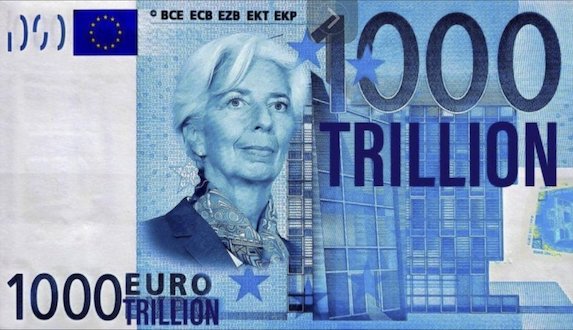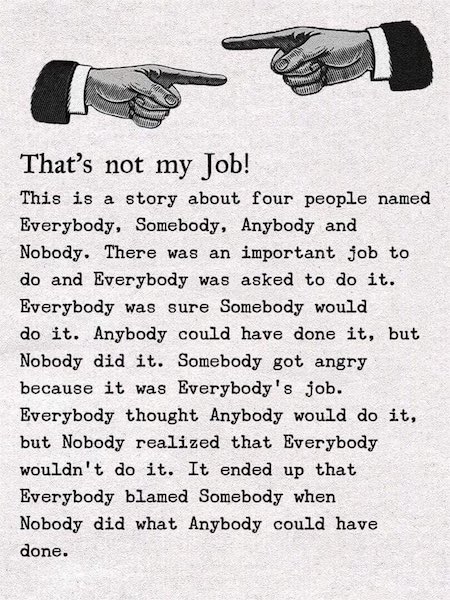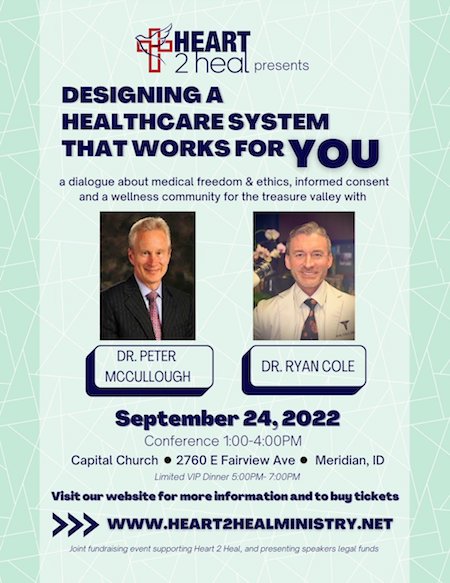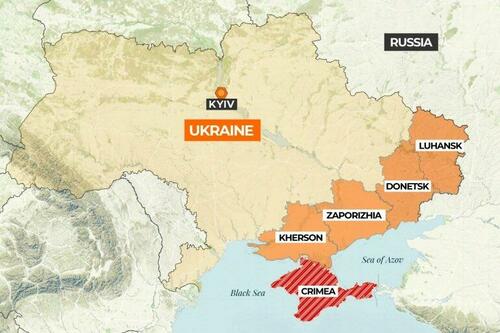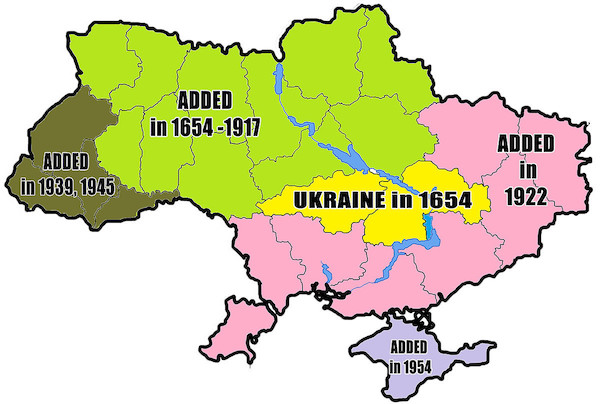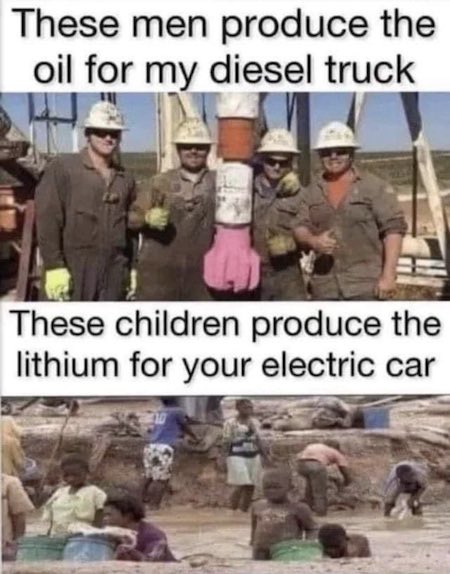
Salvador Dali Bather 1924

I’ve assembled so much material on the pipeline sabotage, I’ll -largely- deal with that separately.

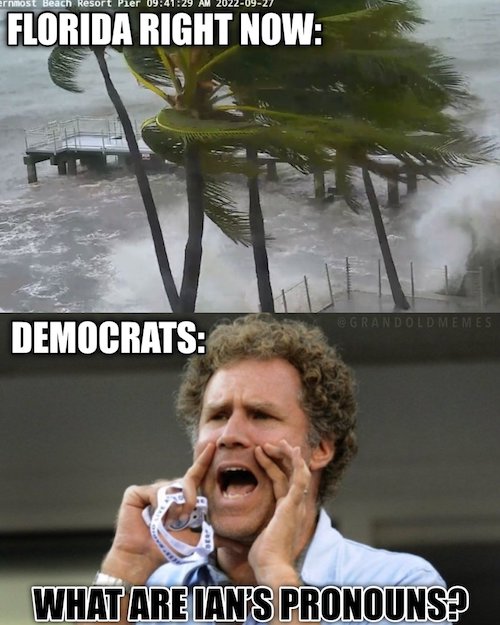

Hurricane vaccine
My house in Tampa is getting flooded and destroyed, but thank God I’m vaccinated. pic.twitter.com/nrcWtVY4tw
— Will Witt (@thewillwitt) September 27, 2022





Rosa Koire
https://twitter.com/i/status/1574735606676013058

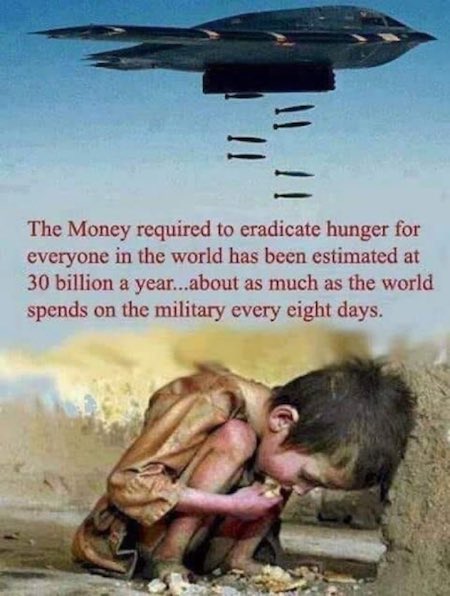


“Immediately the Russian Constitution will come into force in relation to these territories where everything is very clearly stated in this regard..”
• Four Regions Vote To Join Russia: What’s Next? (RT)
The Donetsk and Lugansk People’s Republics (LPR and DPR) along with Kherson Region and part of Zaporozhye Region in southern Ukraine have voted to join Russia in referendums that were held between September 23 and 27. In Lugansk, more than 98% of voters have supported the idea to join Russia, official figures show with all the ballots counted. Donetsk has shown similar results with more than 99% of voters supporting the move. Both Zaporozhye and Kherson regions have process all the ballots by late Tuesday, with 93% and 87% of voters respectively backing the split from Ukraine and reunification with Russia. The process of integrating new regions into Russia may take some time as it requires the approval of the country’s parliament and the president.
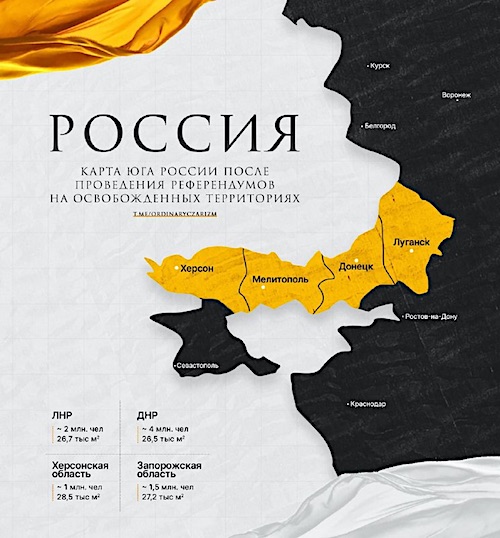
But Kremlin spokesperson Dmitry Peskov said on Friday that he was “convinced it will be fast enough.” Under the Russian constitution and the federal law on the accession of new constituent members, the procedure includes several steps. Once the regions willing to become part of the Russian Federation submit their proposals to Moscow, the president should inform parliament and the government on the matter, Senator Konstantin Kosachev explained in a Telegram post last week. If a political agreement on the accession is reached, “draft international treaties on the admission of foreign states or parts of them” to Russia should be developed, Kosachev, the vice speaker of the upper house of parliament, said.
These agreements regulate issues such as the name and status of new territories, citizenship, succession, the functioning of public authorities, the operation of legislation, and so forth. After these treaties are signed, the Russian Constitutional Court should verify if they comply with the country’s supreme law. If there are no violations, the next step will be the ratification of the documents by the lower house, the State Duma, and their approval by the upper house, the Federation Council. Simultaneously, a draft federal constitutional law on the admission of new constituent units to Russia should be submitted to the Duma. If approved, it then goes to the upper house for consideration. “This law enters into force no earlier than the entry into force of the international treaties themselves,” Kosachev noted.
Moscow warned earlier that if the Donbass republics and the two southern Ukrainian regions united with Russia, it would consider any attempts by Kiev to retake them as attacks on its own land. “Immediately the Russian Constitution will come into force in relation to these territories where everything is very clearly stated in this regard,” Peskov told journalists last week. Shortly after the regions decided to hold referendums, Russian President Vladimir Putin announced a partial mobilization that involved calling to arms some 300,000 reservists, according to the military. Media reports have suggested that Moscow allegedly plans to mobilize up to a million.
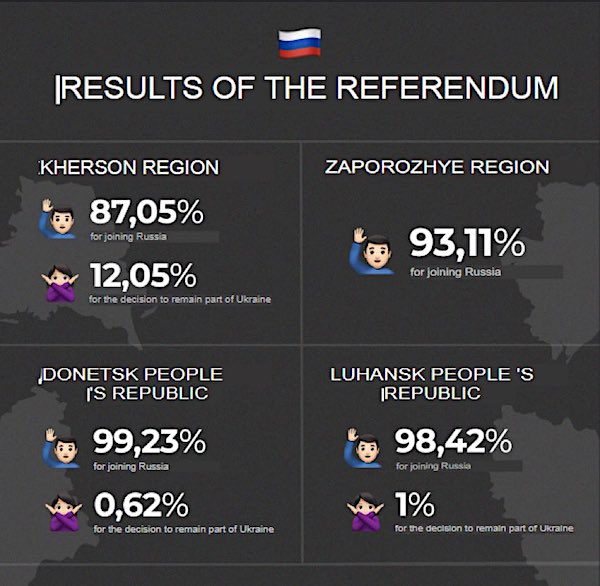

“Experts say repairs on both pipelines could take up to several years.”
• Russia’s Main Gas Pipeline To EU Suffers Unprecedented Damage – Operator (RT)
The simultaneous destruction of three gas pipelines in the Baltic Sea is unprecedented, Nord Stream AG, the operator of Nord Stream 1, said on Tuesday. It declined to provide a deadline for repairs. The pipeline had been supplying gas to the EU until late August, when Russia slashed deliveries, citing technical difficulties resulting from Western sanctions. “The destruction that occurred on the same day at once on three strings of the offshore gas pipelines of the Nord Stream system is unprecedented. It is not yet possible to estimate the timing of the restoration of the gas transmission infrastructure,” the company said.
On Monday, Danish authorities spotted a gas leak near the island of Bornholm in the Baltic Sea, and closed off an area of five nautical miles (9.26km) around the site. The discovery came shortly after the defunct Nord Stream 2 pipeline suffered a drastic loss of pressure overnight. German and Danish authorities are investigating the incidents. Nord Stream spokesman Ulrich Lissek said a “large bubble field near Bornholm” was spotted, adding that “the pipeline was never in use, just prepared for technical operation, and therefore filled with gas.” Meanwhile, on Tuesday, Sweden’s Maritime Authority also reported leaks on the Nord Stream 1 pipeline northeast of the Bornholm island in Swedish and Danish waters, Reuters reported, citing the country’s officials.
“There are two leaks on Nord Stream 1 – one in the Swedish economic zone and one in the Danish economic zone. They are very near each other,” a Swedish Maritime Administration spokesperson said. As the German Tagesspiegel newspaper reported on Tuesday, Nord Stream pipelines may have been damaged as a result of attacks. “A pressure loss in the two gas pipelines that occurred in rapid succession” could have happened due to a “targeted action,” it said. Experts say repairs on both pipelines could take up to several years. Lissek warned that it would be complicated to determine the reasons for the drop in pressure due “the sanctions regime and the lack of personnel on the ground.”
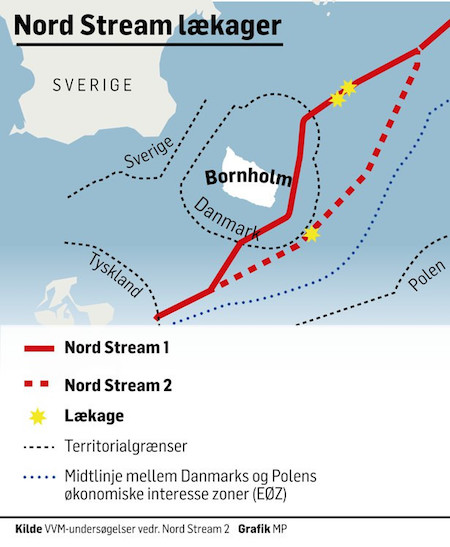

“..a deliberate attack on the pipeline could only have been carried out using special forces, navy divers or a submarine”
• Kremlin Comments On Possible Causes Of Nord Stream Damage (RT)
The Nord Stream pipelines may have been damaged in an act of sabotage, Kremlin spokesperson Dmitry Peskov suggested when asked about the possible reasons for sudden pressure loss in three of the Baltic Sea gas network’s lines. Speaking to journalists on Tuesday, Peskov commented on a statement made by Nord Stream AG, the operator of the network, which said three offshore lines of the Nord Stream pipeline system sustained “unprecedented”damage in just one day. “No option can be ruled out right now,” Peskov said when asked if the damage may have been the result of sabotage. He added that Moscow is very concerned about the situation, and called for an immediate and thorough investigation into the incident, which has implications for energy security on the “entire continent.”
Pressure in line A of the Nord Stream 2 pipeline, which was pumped with gas but had yet to go into operation, suddenly dropped overnight between Sunday and Monday. Shortly after that, on Monday afternoon, both of Nord Stream 1’s pipelines also suffered a sharp loss of pressure. Sweden and Denmark’s coastguards have since reported gas leaks off the coast of Bornholm island in the Baltic Sea – one in the Swedish economic zone and one in the Danish zone – and closed off the area to maritime traffic. According to a report from the Tagesspiegel newspaper on Tuesday, Berlin believes the sudden pressure drop in three gas pipelines at the same time could not be a coincidence and is likely a “targeted attack” from either Ukraine or Russia.
The outlet explained that a deliberate attack on the pipeline could only have been carried out using special forces, navy divers or a submarine. Berlin reportedly believes the sabotage was carried out by either “Ukraine-affiliated forces” or by Russia itself as a “false flag” operation to make Ukraine look bad and drive energy prices in the EU even higher. Nord Stream 1 was completed in 2011. Construction work on Nord Stream 2 (NS2) began in 2018, and suffered delays due to political pressure and sanctions from the US. NS2 was finished and pressurized in September 2021. However, two days prior to Russia’s military operation in Ukraine, the German government put its certification on indefinite hold, and has categorically rejected any suggestion from Moscow – or domestically – to unblock the pipeline.

With Nordstream gone, they have to pay transfer fees again, to Ukraine and Poland. In dollars and euros.
• European Nat Gas Prices Soar After Gazprom Warns Ukraine Flows At Risk (ZH)
In a day of constant news surrounding European gas flows, including the potential sabotage of the Nord Stream pipeline, moments ago, Russia state-owned gas giant Gazprom PJSC warned that another major source of gas flows to Europe was at risk, just hours after three massive gas pipelines were hit by suspected sabotage. As Bloomberg reports, in a dramatic escalation of the energy standoff between Russia and Europe in little over 24 hours, the Nord Stream pipeline was knocked out by what German officials said looked like sabotage. Gazprom then said that one of two remaining routes bringing gas to Europe – via Ukraine – was at risk because of a legal spat. Specifically, as Reuters notes, Gazprom rejected all claims from Ukraine’s energy firm Naftogaz in arbitration proceedings over Russian gas transit, and had notified the arbitration court.
It also said that Russia may introduce sanctions against Naftogaz in case it further pursues the arbitration case, meaning Gazprom would be prohibited by the sanctions from paying Ukraine the transit fees. Naftogaz had initiated a new arbitration proceeding against Gazprom earlier this month, saying the Russian company did not pay for the rendered service of gas transportation through Ukraine. The company had said “funds were not paid by Gazprom, neither on time nor in full” for the gas transit. Gazprom said on Tuesday that Naftogaz had no “appropriate reasons” to reject its obligations on transit via the Sokhranovka point, a key route for Russian gas exports to Europe. In May, Ukraine suspended the flow of gas through Sokhranovka, which it said delivers almost a third of the fuel piped from Russia to Europe through Ukraine, blaming Moscow for the move and saying it would move the flows elsewhere.
Following the report that Russia may soon halt natgas transit via Ukraine, gas prices quickly jumped almost 20% as traders factored in the prospect that Europe will have to live without Russian gas this winter – and beyond. Gazprom said that a legal dispute risks prompting Moscow to sanction Ukraine’s Naftogaz. If that happened, then Gazprom would be unable to pay transit fees, the company said on Telegram, putting at risk flows. “In practice, this will mean a ban on Gazprom from fulfilling obligations to sanctioned bodies under completed transactions, including financial transactions,” the company said. If, or rather when, supplies through Ukraine are shut down, it would leave Gazprom sending gas only via the TurkStream pipeline to Turkey and a handful of European countries that haven’t severed business ties with Russia.
Winter is coming
Winter is coming… pic.twitter.com/WHuKTUChFM
— Wojciech Pawelczyk (@Woj_Pawelczyk) September 27, 2022

“Russia is set to harvest a record amount of grain this year [..] But Russian food products have a difficult time finding their way to the global market due to Western economic sanctions, as do Russian fertilizers..”
• Putin Blasts West’s ‘Predatory’ Food ‘Swindle’ (RT)
“Predatory” monetary and trade policies pursued by the US and its allies are the primary cause of the global food crisis, Russian President Vladimir Putin has said. Western nations are using their wealth and ability to print money to vacuum up food products from the global market, the Russian leader said during a government meeting on Tuesday. The unfolding crisis has been in the making for several years, he claimed. “Some leading nations have financial and food policies that led to the result we are observing now,” Putin said, adding that the behavior could be described as “predatory, without any exaggeration.” He noted that the US was a net exporter of food products last year, but now it is a net importer.
The Russian leader also reiterated his criticism of the Ukraine grain deal, which allowed Kiev to export food via the Black Sea. The arrangement was mediated by the UN and Türkiye, but Russia believes it is not working as intended, arguing that the shipments do little to alleviate food shortages in needy nations. Putin cited last week’s maritime traffic statistics in relation to the scheme, pointing out that most of the ships carrying Ukrainian grain that didn’t report Türkiye as their destination went to one of the EU nations. “Are they the poorest nations or what? The situation remains the same. Embarrassing as it sounds, but this is plain swindle, and nothing else,” he said.
Russia is set to harvest a record amount of grain this year, which is predicted to reach 150 million tons, including some 100 million tons of wheat, Putin said. But Russian food products have a difficult time finding their way to the global market due to Western economic sanctions, as do Russian fertilizers, he added. The West “is causing the global food crisis,” he claimed. The US and its allies deny that the restrictions they have imposed on Russian trade over the country’s military campaign in Ukraine are targeting its food and fertilizer exports. Officials in Moscow say that, while those products are technically not banned, restrictions on things like insurance and port services for Russian merchant ships effectively curb the country’s ability to export food and fertilizers.

“Blinken also accused Russia of a “diabolical scheme” to deport or “disappear” the local Ukrainian population and “bus in” Russians..”
• Ukraine Can Use Western Weapons Against ‘Territories Seized By Russia’ – US (RT)
Washington has no objections to Kiev using Western-supplied weapons to target territories that may decide to join Russia, as the US considers the vote to do so illegitimate, Secretary of State Antony Blinken said on Tuesday. The US and its allies have supplied Ukraine with a variety of weapons, including tube and rocket artillery. At a joint press conference with his Indian counterpart Dr. Subrahmanyam Jaishankar in Washington, Blinken was asked if the US had any objections to Ukraine using those weapons to attack targets in Donetsk, Lugansk, Zaporozhye and Kherson, which just wrapped up a vote on joining Russia. “We will never recognize the annexation of Ukrainian territory by Russia,” Blinken told reporters.
“Ukraine has the absolute right to defend itself throughout its territory, including to take back the territory that has been illegally seized, one way or another, by Russia. And the equipment, the weapons that we and many other countries are providing, have been used very effectively to do just that.” Russia’s “annexation” of the Donbass republics and the two regions will make zero difference to either Ukraine or the US, Blinken insisted. “The Ukrainians will continue to do what they need to do to get back the land that has been taken from them. We will continue to support them in that effort.” In June, when the US first sent long-range HIMARS rocket artillery to Ukraine, Blinken said he had received “assurances” from Kiev that they will not be used on Russian territory, and that he believed them due to a “strong trust bond.”
Kiev’s forces have since used the US-supplied weapons to target civilians in Donbass, Kherson and Zaporozhye, which are under Russian control. Ukraine has also bombed Crimea and border towns in the Russian regions of Kursk and Belgorod. Crimea rejoined Russia in March 2014, after the US-backed coup in Kiev, while Donetsk and Lugansk declared independence. Blinken also accused Russia of a “diabolical scheme” to deport or “disappear” the local Ukrainian population and “bus in” Russians who would then vote in a manipulated referendum to get annexed by Moscow.

Given that there is no real information available in the US, this is quite the poll.
• Americans Are Growing Tired Of Support For Ukraine Without Diplomacy (BI)
A new poll suggests that many Americans are growing weary as the US government continues its support of Ukraine in its war with Russia and want to see diplomatic efforts to end the war if aid is to continue. According to a poll conducted by the Quincy Institute for Responsible Statecraft and Data for Progress, 57% of likely voters strongly or somewhat support the US pursuing diplomatic negotiations as soon as possible to end the war in Ukraine, even if it requires Ukraine making compromises with Russia. Just 32% of respondents were strongly or somewhat opposed to this. And nearly half of the respondents (47%) said they only support the continuation of US military aid to Ukraine if the US is involved in ongoing diplomacy to end the war, while 41% said they support the continuation of US military aid to Ukraine whether the US is involved in ongoing diplomacy or not.
The Biden administration and Congress need to do more diplomatically to help end the war, according to 49% of likely voters, while 37% said they have done enough in this regard, the poll showed. “Americans recognize what many in Washington don’t: Russia’s war in Ukraine is more likely to end at the negotiating table than on the battlefield. And there is a brewing skepticism of Washington’s approach to this war, which has been heavy on tough talk and military aid, but light on diplomatic strategy and engagement,” said Trita Parsi, executive vice president at the Quincy Institute. “‘As long as it takes’ isn’t a strategy, it’s a recipe for years of disastrous and destructive war — conflict that will likely bring us no closer to the goal of securing a prosperous, independent Ukraine.
US leaders need to show their work: explain to the American people how you plan to use your considerable diplomatic leverage to bring this war to an end,” Parsi added. The poll found close to half of likely US voters (48%) somewhat or strongly oppose the US providing aid to Ukraine at current levels if long-term global economic hardship, including in the US, occurs. Meanwhile, the poll showed that only four-in-10 Americans somewhat or strongly support the US providing aid to Ukraine at current levels if this occurs.

“..will bring total US spending on the war since Russia invaded to $65.9 billion, which is the same number as Russia’s entire military budget for 2021.”
• US Preparing $1.1 Billion Arms Package for Ukraine (Antiwar)
The US is preparing a new $1.1 billion arms package for Ukraine that will be announced soon, Reuters reported Tuesday, citing unnamed US officials. The weapons package will likely include HIMARS rocket systems, HIMARS ammunition, counter-drone systems, radar systems, training, and technical support. The arms package is expected to be provided to Kyiv using the Ukraine Security Assistance Initiative (USAI) as opposed to sending the arms directly from US military stockpiles. The USAI allows the Biden administration to purchase military equipment for Ukraine from the US arms industry.
The new package will bring the total amount of US arms pledged for Ukraine since Russia invaded on February 24 to over $16 billion. Funds for Ukraine are still being pulled from the $40 billion aid package President Biden signed into law back in May, but Congress is preparing to authorize more spending to support the war. Congress unveiled on Tuesday a new $12.3 billion aid package for Ukraine that will be included in a stopgap funding bill that needs to be passed this week to avoid a government shutdown. The $12.3 billion includes military and economic support for Ukraine and will bring total US spending on the war since Russia invaded to $65.9 billion, which is the same number as Russia’s entire military budget for 2021.

Valdai Club Programme Director Timofey Bordachev.
• Questions Over The Value Of Military And Political Alliances (Bordachev)
The continuing military and diplomatic clash between Russia and the West, led by the United States, raises questions to which, until recently, the answers seemed obvious. These include the phenomena of permanent alliances and allied relations. It is no secret that the behaviour of Moscow’s formal allies in the CSTO (Collective Security Treaty Organization) and the Eurasian Economic Union (EAEU) in today’s environment raises questions for the Kremlin, while Russia’s opponents are raising hopes that the existence of these blocs is no longer an advantage, but a problem, for Russia’s foreign and defence policy. We see examples of individual member countries of the CSTO or the EAEU meeting US demands in matters related to economic warfare against Russia. This makes one wonder how important and necessary are Russia’s allies when it cannot, like the US, exercise authoritarian control over its foreign and defence policies?
The phenomenon of permanent alliance relations is a relatively recent invention in international politics – it emerged after the Second World War and it is entirely unknown whether the next round of global upheavals of a similar scale will see it survive. Even if we are not all blown to bits by a general nuclear catastrophe in the coming years, what is happening makes the prospects for all the phenomena that have shaped the fabric of international life in recent decades, without exception, highly uncertain. Today, the benchmark example of a permanent alliance of sovereign states is European integration. Another similar example is the NATO bloc, in which participation is cemented by the unconditional authority of a power far superior to its allies and not shy in making that clear.
It is no coincidence that the conflict around Ukraine, the first major war of the new era in international politics, is linked to the development of these two alliances. A strong group of states inevitably creates conflicts around itself. Indeed, this becomes a consequence of the fact that it protects the interests of its members. [..] the whole idea of an alliance in the usual sense of the word has lost all meaning. First and foremost, for its leading participant. The small member states obviously have neither alternative options nor the military, political or demographic resources for fully independent survival. This helps us to solve the problem of the formal preservation of such associations, even if they lose much of their necessary functions and content. However, it should be understood that, in the future, Russia, like its neighbors, will either have to give up the idea of institutionalizing its relations or resort to rather more authoritarian methods of governance.

A decade of financial disaster.
• White House Mulling Potential Yellen Departure After Midterms (Axios)
White House officials are quietly preparing for the potential departure of Treasury Secretary Janet Yellen after the midterms, the first and most consequential exit in what could be a broad reorganization of President Biden’s economic team, according to people familiar with the matter. While her potential departure would give Biden an opportunity to respond to public concern over his handling of the economy, it would also create an immediate political headache: finding a successor who can be confirmed by the Senate. The process is in the early stages and a decision on Yellen, or any Cabinet replacement, has not been made. Multiple sources stressed the outcome of November’s election, including who controls the Senate, will factor into whether she stays.
Yellen will also have some say in her fate, and with the world’s economy teetering, there could be a convincing case for her to stay. In addition to Yellen, officials are also considering the possibility that Brian Deese, the director of the National Economic Council, will leave early next year. Deese’s departure would present an opportunity for Gene Sperling, who is currently coordinating the implementation of the $1.9 trillion American Rescue Plan, to serve an unprecedented third term as NEC director after holding that post in the Clinton and Obama administrations. Cecilia Rouse, the chair of the Council of Economic Advisers, is also expected to return to her academic post in the spring of 2023, opening up another Cabinet-level economic position.
Yellen, an economist by trade and at heart, has been reluctant to make overly political arguments when they violate her core academic beliefs. The former Fed and CEA chair has disagreed with the White House on several high-profile issues, including the White House faulting corporations for increasing inflation and — most recently — Biden’s decision to forgive some student debt. She has also made several statements that White House officials have privately viewed as blunders. Yellen publicly admitted this summer she was wrong on inflation, and last year said it would be a “plus” if the Fed raised interest rates.

“..that Trump would not be able to face his accusers before being impeached did not sit right with Nadler, who warned Pelosi and Schiff of the ramifications it would have in the long run.”
You made your bed, Jerry. Lie in it.
• Nadler Feuded With Schiff, Pelosi Over Unconstitutional Trump Impeachment (Fox)
A new book reveals that House Judiciary Chairman Jerrold Nadler, D-N.Y., was at odds with how House Select Intelligence Committee Chairman Adam Schiff, D-Calif., and House Speaker Nancy Pelosi’s handling of impeachment proceedings against former President Trump, insisting that the methods used by the prominent Democrats were “unconstitutional” and could be used to attack the party. The revelation comes in a book set to be released on October 18 titled, “Unchecked: The Untold Story Behind Congress’s Botched Impeachments of Donald Trump,” written by Politico Playbook co-author Rachael Bade and Washington Post reporter Karoun Demirjian. The book chronicles the methods Democrats used to target Trump.
In October 2019, amid the Democrats’ plan to hold a full House vote on a resolution outlining the structure of impeachment proceedings against Trump, Nadler, according to the book, took issue with how Schiff, who was tapped by Pelosi to lead impeachment efforts, was prepared to proceed with the impeachment without due process for Trump. Worried about the situation and the likelihood that his Judiciary Committee would not be able to cross-examine witnesses as the committee had done traditionally, Nadler confronted Schiff about the planned process, and, according to the book, said: “It’s unfair, and it’s unprecedented, and it’s unconstitutional.” “I don’t appreciate your tone,” Schiff allegedly responded. “I worry you’re putting us in a box for our investigation.”
Sidelined by Pelosi to handle impeachment proceedings in the House, the book claims Nadler made an “effort to get back into Pelosi’s good graces” and that his “aides sucked up to her staff relentlessly” in an attempt to show that his panel was prepared to step in and assist. Striving to earn approval from Pelosi, Nadler hired attorneys and had his team pour through records and books from the impeachments of former Presidents Nixon and Johnson. Those efforts worked and led Pelosi and Schiff to reconsider the Judiciary Committee’s involvement in the process, although they had “their own ideas about how he should run his committee process,” according to the book.
“She didn’t want the Judiciary panel to interview witnesses at all,” the book’s authors wrote. “Pelosi simply didn’t trust the panel — which was stacked with liberal crusaders and hotheaded conservatives — to handle the rollout of the complex Ukraine narrative with the careful, compelling treatment it required. She couldn’t afford another Nadler screwup. The Judiciary chairman could focus on the legal business of crafting the articles of impeachment and have academics testify, she allowed. But that was it.” Nadler’s frustration with the pair of Democrats grew. Research conducted by his team proved that presidents facing impeachment from Congress had been allowed to defend themselves before the House Judiciary Committee, with attorneys for the president having the opportunity to attend hearings, as well as cross-examine testifying witnesses or call their own.
That did not matter to Schiff, and the fact that Trump would not be able to face his accusers before being impeached did not sit right with Nadler, who warned Pelosi and Schiff of the ramifications it would have in the long run. “If we’re going to impeach, we need to show the country that we gave the president ample opportunity to defend himself,” Nadler told them, according to the book.

“She is my rival and we will continue to fight each other, but the idea that now there is a risk of fascism in Italy is absolutely fake news.” – Renzi
• Liberal Former PM Renzi Dismisses ‘Fascism’ Brewing in Italy Claims (BB)
Former liberal Prime Minister of Italy Matteo Renzi has dismissed alarmist claims in the global media that incoming Prime Minister Giorgia Meloni is a “danger to democracy”, telling CNN “the idea that now there is a risk of fascism in Italy is absolutely fake news.” “Personally, I was against Giorgia Meloni. I’m not her best friend. We grew up together in politics, but we are, and will be, rivals, always,” said Renzi, who served as Prime Minister of Italy for nearly three years until December 2016, and is the leader of the liberal “Italia Viva” party. “At the same time, I think [Meloni] is not a danger [to] Italian democracy,” Renzi continued. “She is my rival, and we will continue to fight each other, but the idea that now there is a risk of fascism in Italy is absolutely fake news.”
The former Prime Minister went on to say that Meloni won Sunday night’s election, “particularly because populism, a lot of times, [wins] in Italy.” “She has a majority coalition, and probably she will be — I think next month — the next Prime Minister,” Renzi said, before doubling down on his claim that “democracy” is not at risk. “That is very important, because I fought against her, but at the same time, I think there is not a danger for fascism in Italy,” Renzi affirmed. Elsewhere in the interview, Renzi mentioned that he is “exactly the opposite of Giorgia Meloni, because she is a sovereigntist and I’m for Europe” [the European Union]. The international media has been quick to compare her to wartime fascist leader Mussolini, a serious allegation. Yet as Renzi’s comments demonstrate, not even Meloni’s own opposition inside Italy believes this to be true.
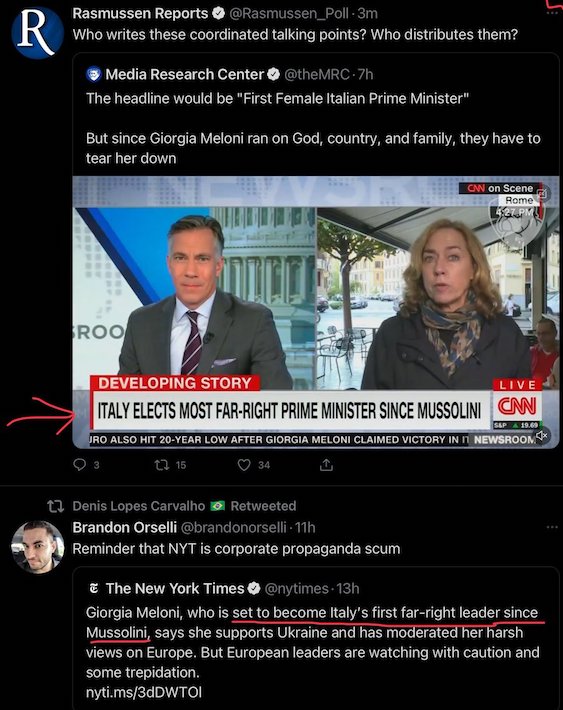

“Me, I believe Mussolini was a good politician,” Meloni said in an interview. “By which I mean that everything he did, he did for Italy.”
• Meloni Contra Mundum (Gonzalez)
[..] liberal democracies across the West unified this weekend in denouncing the democratic will of the Italian people, who have just propelled Giorgia Meloni and her right-wing Italian nationalist party to electoral victory. Man is a symbolic animal, and Meloni’s victory is seen as a symbolic rejection of Western liberalism. Whether she lives up to that potential is yet to be seen. But the electricity of the moment is palpable: the Italians have voted against the times. It’s difficult to dislike this atypical politician. Meloni’s father abandoned his family when she was just 11 years old, leaving her mother to raise her alone. She has working-classes bona fides, working as a nanny, waitress, and bartender to support herself. She has been politically engaged since she was a teenager and has never been shy about her views.
“Me, I believe Mussolini was a good politician,” Meloni said in an interview. “By which I mean that everything he did, he did for Italy.” Though she may not have read Legutko, Meloni has also noticed the similarities between communism and liberal democracy. “We did not fight against and defeat communism in order to replace it with a new internationalist regime,” she said during the National Conservatism conference in Rome, “but to permit independent nation-states once again to defend the freedom, identity, and sovereignty of their peoples.” Meloni has denounced the mass immigration of non-European people to European lands and called for naval blockades in the Mediterranean to thwart migrant smugglers. She also went against the grain on COVID-19 vaccines and lockdowns. Meloni was the only party leader to oppose the so-called Green Pass—a vaccine passport that would have been required to work, travel, and shop.
Under different circumstances, the West might be celebrating the ascent of this underdog. But her politics are, for the most part, outside the West’s liberal democratic consensus, which is why Italians love her. Most of all, Meloni breaks the consensus on social and cultural issues at the center of liberalism’s moral universe. She emphatically opposes abortion and same-sex marriage, rejects gender ideology and the promotion of alternative sexual lifestyles. At a rally before an audience that stood to its feet and applauded ceaselessly at her words, Meloni thundered: “Yes to natural families, no to the LGBT lobby, yes to sexual identity, no to gender ideology, yes to the culture of life, no to the abyss of death, no to the violence of Islam, yes to safer borders, no to mass immigration, yes to work for our people.”

“You may not like ms. Meloni’s political orientation but she is a human being and, as such, she deserves respect, especially considering that she has taken upon herself a tremendously difficult task.”
• Human Sacrifices: are They Coming Back? (Ugo Bardi)
If there ever was a society under stress, it is ours. We passed all the limits of survival: destroyed the oldr-growth forests, killed off large number of species, poisoned the atmosphere, depleted our mineral resources, eroded the fertile soil, polluted water and the atmosphere, set the planet on a path to an irreversible warming and a few more little things, including having deployed a sufficient number of nuclear warhead to wreck the ecosystem and, most likely, kill everybody. And we haven’t renounced to our beloved habit of making war against each other. Would you be surprised if we were to indulge in large scale human sacrifices? We are not yet there, but the path seems to be traced. Have you noted how popular are the “Zombie” movies?
Take a look at them in light of what I have been saying here: do you see them as a blueprint for the mass extermination of suburbanites? First starve them, easy: just stop the delivery to the local supermarkets and service stations. Once they run out of food and fuel, they are doomed. Then, while they are still able to stumble along, finish them off with a bullet to the head. Truly, the fascination with this idea casts much light on what our society has in mind for the near future. We are not yet to the point of seeing the elites booking zombie-killing safaris in the suburbs of our cities. But other possible large scale sacrifices are possible. I already mentioned how the German government had hired the country’s doctors to cull the undesirables. They had complied, happily. That could be easily done in our times, too.
The concept of human sacrifice, though, is not about numbers, but about the visible high-status of the victim. Now, after the electoral victory of Giorgia Meloni in Italy, many people commented by publishing on their social accounts the images of Mussolini’s dead body and of his lover Claretta Petacci. A clear message to Ms. Meloni, just as the many published images showing her upside-down, just like Mussolini and Petacci were. Will she undergo the same treatment as Mussolini? For sure, Italy is going toward a difficult period and whoever will lead the country risks being deemed responsible for whatever disaster will befell Italy in the near future. And it is also true that people can be extremely nasty when they are in a dire situation. You may not like ms. Meloni’s political orientation but she is a human being and, as such, she deserves respect, especially considering that she has taken upon herself a tremendously difficult task. We can and we should wish her success. Good luck, Giorgia, you’ll need a lot of it.

They don’t want to believe themselves.
• Pro-Vaccine Doctor Suspects Pfizer Booster Sent His Cancer Into Overdrive (CHD)
Michel Goldman, M.D., Ph.D., professor of immunology and pharmacotherapy at the Université libre de Bruxelles in Belgium, suspects his third dose of Pfizer’s COVID-19 vaccine may have sent his cancer into overdrive. Goldman, 67, is one of Europe’s best-known champions of medical research and a lifelong promoter of vaccines. But he told The Atlantic he wants discussion of the COVID-19 vaccine to be transparent — so he went public about his suspicion that the Pfizer booster shot he received on Sept. 22, 2021, may have induced rapid progression of his angioimmunoblastic T-cell lymphoma (AITL), a type of lymphoma he’d been diagnosed with before he got the booster shot. After his diagnosis, Goldman said he rushed to get the booster shot, believing he would need it more than most people because once he started chemotherapy, his immune system would be compromised.
But after receiving the shot, Goldman’s follow-up CT scan showed something unexpected: Within only a few days, his cancer had grown so fast that cancerous points were lighting up all over his scan. “It looked like someone had set off fireworks inside Michel’s body,” The Atlantic reported. Goldman and his brother, Serge Goldman, a fellow scientist and head of nuclear medicine at the teaching hospital of the Université libre de Bruxelles, suspected Goldman’s COVID-19 booster shot may have triggered the rapid proliferation of cancerous growth in his body. The initial CT scan had been “a bit disturbing,” Serge Goldman told The Atlantic, because it showed an asymmetrical cluster of cancerous nodes around Goldman’s left armpit, where Michel’s first two doses of vaccine had been delivered.
The CT scan done after Michel’s third dose showed the cancer’s asymmetry had flipped and was clustered by his right armpit, where he received the third shot. The brothers knew it could be a mere coincidence, but they thought it was important to investigate the possibility that the vaccine might be behind the clustering — because it could mean other people with certain forms of cancer might be at risk of a COVID-19 vaccine causing their cancer to progress more rapidly. So on Nov. 25, 2021, the brothers — who had written prior papers together — and other colleagues published a case report in which they described Michel Goldman’s experience and urged the scientific community to study the phenomenon to see if it occurred in patients diagnosed with AITL.

The CDC is politics disguised as science.
• CDC Finds Lasting Post-vaccine Heart Problems In Young Adults (JTN)
The CDC continues to erase distinctions by COVID-19 vaccination status in public health guidance as ongoing global research — including its own — documents the mediocre performance of COVID vaccines and their unexpectedly high rates of lasting harm in some groups. Vaccination status is no longer used “to inform source control, screening testing, or post-exposure recommendations” for healthcare personnel, the Friday update to their CDC guidance says. The agency “[c]larified” that healthcare facilities, including nursing homes, have discretion on whether to screen-test asymptomatic personnel. It also now says asymptomatic patients “in general” do not require “empiric use of Transmission-Based Precautions” after exposure to an infected person.
A CDC study of 12-29 year-olds with heart inflammation following mRNA vaccination, published last week in The Lancet Child & Adolescent Health, found that 1 in 6 still had not “fully recovered” at least 90 days after myocarditis onset, including 1 in 100 who hadn’t improved at all. Myocarditis has increased so markedly among youth since vaccines were authorized for them that an Ivy League-affiliated hospital started running TV ads this month for its treatment in children. New York-Presbyterian marked the ad’s Sept. 6 YouTube video private less than two weeks later, following criticism that it was trying to “normalize” a vaccine-induced condition. The CDC’s COVID-19 Response Team found more than 800 myocarditis reports to the Vaccine Adverse Events Reporting System from Jan. 12 to Nov. 5, 2021 that matched the parameters for age and time since onset.
Excluding those without phone numbers or who couldn’t be reached, they studied 393 individuals whose healthcare providers, mostly cardiologists, completed a survey. The median age was 17 and overwhelmingly male. The team deemed four in five patients “fully or probably fully” recovered (320). But two-thirds of those initially required non-intensive care hospitalization, and 27% required intensive care. At their last provider followup, 28% of the fully recovered were still on doctor-ordered physical activity restrictions. The figures for the 65 patients who were not fully recovered: 62% non-intensive hospitalization and 18% intensive, and 48% still on physical activity restrictions. Less than a third had been cleared for physical activity, half the figure for the fully recovered, who had a median clearance of 10 fewer days (104).






Beach front
https://twitter.com/i/status/1574535405051019264

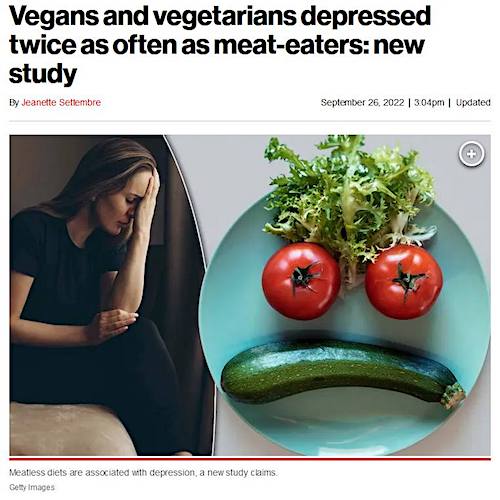



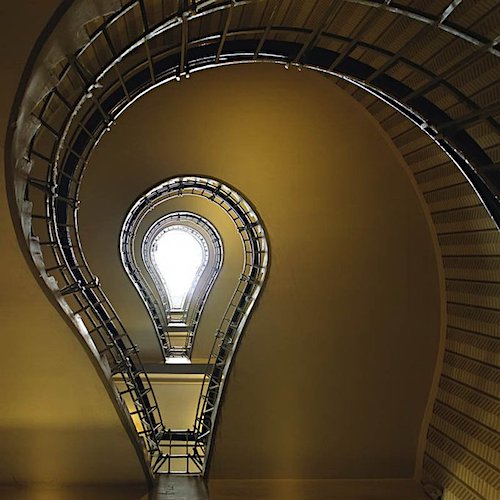
Staircase



Bird
https://twitter.com/i/status/1574778092131860483


Support the Automatic Earth in virustime with Paypal, Bitcoin and Patreon.




